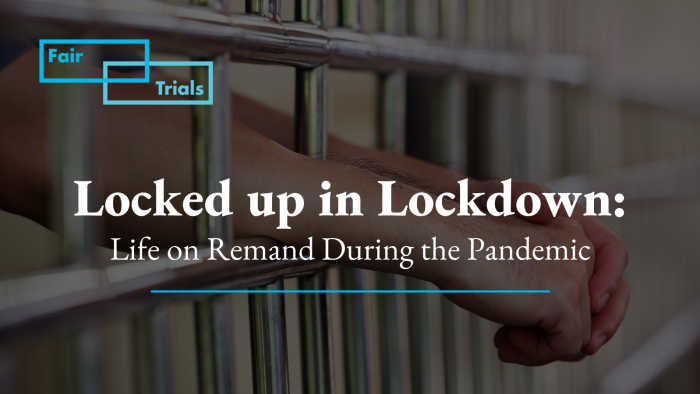
This report details the individual accounts, thoughts and emotions of more than 20 people who are or have recently been remanded in custody – prison – awaiting trial during the Covid-19 pandemic. They wrote to Fair Trials following an advert we placed in Inside Time newspaper, requesting people to write about their experiences of pre-trial detention during the pandemic.
They are or have been held in 19 different prisons all around England and Wales, from London to Liverpool, Kent to Gloucester, Lewes to Durham, Nottingham to Wrexham. Many have families whom they have not seen for months, and in some cases years, their lives put on hold.
People held on remand have not been found guilty of an offence and they should only be held in custody awaiting trial as an exceptional measure, a measure of last resort. It is vital that the presumption of innocence is upheld while they are waiting for their trial, and that they are not held in detention unless there is a legitimate reason. Nevertheless, cases must also be brought to trial within a reasonable time. However, as these accounts show, the current situation is shocking. The backlog of tens of thousands of cases awaiting trial – a backlog which the government has failed to address – means that people have been and continue to be held on remand awaiting trial for months, sometimes years, far beyond custody time limits set out in law.
People who are remanded in custody to await trial are held in the same prisons as people who have been convicted. Everyone in prison should be treated humanely and with dignity and respect, yet prison conditions during the pandemic have been extremely punishing, with one respondent labelling them “inhumane”. People have been held in their cells for 23-plus hours a day, allowed out only for a shower or for exercise – often facing a choice between the two. In some prisons, people have been prevented from leaving their cells and denied showers for weeks at a time. They have been denied proper access to legal advice or assistance; they have been denied access to healthcare, support and opportunities to learn, as well as opportunities afforded to convicted prisoners. They have suffered physically, mentally, and emotionally, with many detailing serious mental health issues as a result, including self-harm and suicidal ideation. As a result of these conditions, and the sometimes uncertain length of pre-trial detention, people have even felt that they had no choice but to plead guilty to offences they have not committed.
The failure to deal with court delays is not a legitimate reason to hold people in prison awaiting trial for longer, and yet many people are suffering due to that failure. Trial delays affect not just those held in prison awaiting their trial, but also victims, witnesses and all their friends, families and loved ones. As one respondent said, “And if the pandemic will last for 5-10 years, will I await trial for 5-10 years in here?”.
These people deserve to have their voices heard, as much as anyone else in the criminal justice system, and yet they are often the people whose voices, experiences and opinions are paid least attention.

